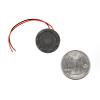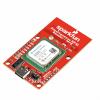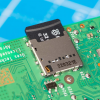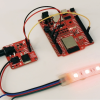I found a free minute to fiddle with Google Trends yesterday (only slightly more scientific than googlefight). He's my take on the current state of electronics:

Sure enough, SparkFun has seen more
search volume since the end of 2006 when google decided to start
tracking us. I wonder what we did to flip a switch like that...


And sure enough, if we start comparing
SparkFun to the other kids in the field, we will all look bad standing
next to Arduino. Those punks, always stealing the show!


Now if we throw some other friends into
the mix, things get interesting. It seems Make Magazine has had some
pretty decent search traffic since before 2005. And it's been very flat
and friendly for the most part. We can now remove SparkFun from the
graph, but notice how Arduino is taking over the world... And what was the coincidental bump for all three of us at the end of 2007?



I have a lot of meetings with potential
part vendors, and none of them understand Arduino. I don't think anyone
does, but I did have a meeting the other week that surprised me. Microchip wanted to meet with us because they were interested in creating an 'Arduino' like board using a PIC processor.
Microchip finally began to understand what it means to get people
early, and using their hardware, and Microchip was sensing (rightfully) that they were loosing market to this thing called Arduino.
Arduino is causing the world to use and learn AVRs. As much as I resisted, I learned ATmegas because Arduino hardware forced me to learn. I now love ATmegas. And if Atmel was smart, they would give Arduino all the free ATmega328s they could possibly want. Check out that graph!
Arduino is causing the world to use and learn AVRs. As much as I resisted, I learned ATmegas because Arduino hardware forced me to learn. I now love ATmegas. And if Atmel was smart, they would give Arduino all the free ATmega328s they could possibly want. Check out that graph!

Speaking of weird graphs, it looks like everyone is declining. I interpret this as follows: the overall search traffic is increasing (on rather useful terms like 'Tiger Woods'), which is driving everyone maintaining the status quo, to a downward trend. I believe Microchip is doing just fine, but when compared to groups that are truly innovating and generating buzz, they (along with NXP and Freescale) are loosing ground.






The Arduino should have been a none starter, proprietary interface and C++ software environment but where they compensated for this was the simple light on, light off examples, in a plug and go environment and the Atmel GCC community. You can start simply but are not limited in complexity.
With the PICs although it?s there as well, it just looks more difficult. Similarly the Parallax Propeller, good development software, DIP format but a proprietary language and six processors to deal with.
All Microchip needs to do to regain some ground is unify its C compilers into one product with a descent user friendly hardware library and give it away, preferably un-LIMITED. Many new users fail with Microchip C compilers because they don?t understand that when you change chip, you may need to recompile the hardware libraries for example. Microchip has 32 bit, ZigBee or Ethernet in an easy step away, plus all under 20 dollars.
I compared Elmo with arduino on google trends, and surprisingly Elmo wins, but is going to be put out of power soon.
I have an old PICEL board and have done things with PICs, but I have pretty much switch to arduinos. The reasons are simple. GCC with libraries. Multi-platform support, Open tool chain and the community. If Microchip wants to get us back, they can do a decent gcc port, make their libraries work across there processor lines with that port, support an eclipse based open source tool chain, make sure they support linux and MAC, and open it all. Then we can and will pick the best silicon for the job. Right now I would not recommend their world with their closed tool chain and for fee compilers. Man that is so 70s, it makes me shake my head and move on. There business model is way out of date.
Today I can, and do, pick up hardware from many sources, if someone gives me a variant, I can modify the libraries and use them. (Took about 1/2 hour to understand pins_arduino.c enough to add in more pins on a variant board. Try doing that on a closed tool chain. Uninteresting in the extreme.)
I outgrew my SX-48 board and went looking for more memory, I/O, and less power. I found the XMega line at AVR and started building my own prototype. Part of the decision to use AVR was the Arduino articles in Nuts & Volts, and the free C compiler. Even better when I found support at SparkFun (tools and forums).
What surprised me most during my research was the lack of support from chip manufacturer's in terms of forums and compilers. These seemed to be for the privileged. With the information I get from the AVR site, I feel confident with what I'm doing and might even be successful.
Is this what Microchip ask you guys to do? http://www.hackinglab.org/pinguino/index_pinguino.html
The design goal of the Arduino was to create a device that was easy to use for people who wanted the functionality of the device, not to learn electronics or programming. Look at what people from the design and art world do with it.
My background is as a software developer and I bought an Arduino because it could operate on the world. I wasn't all that interested in fighting with circuits, not that I'm adverse to learning the electronics.
I would still like a board based on the AVR ARM based chips that could run something like Linux, but has some of the same support that the Arduino has. There are other boards with ARM based chips that have at least some support that I could switch to.
I think that there are a lot of people who start with the Arduino and go on to bigger and better things and come to places like SparkFun to meet their needs.
I think you mean losing instead of loosing ;P
The PIC is starting to get some hacker-friendly projects, partly due to Ian Lesnet's work such as Bus Pirate (sold out already?!) and Web Platform.
Look for the Bus Pirates to come back into stock by Free Day (1/7/10) or shortly thereafter. PCBs are on their way. We definitely did NOT order enough for our first production run(s). :( Our apologies...
We'll be able to build upwards of 240 Bus Pirates when the PCBs arrive, but there are already 26 on backorder. Just a heads up that these 240 may go very quickly!
My theory of the "coincidental bump for all three of us at the end of 2007" - the publication of "Making Things Talk: Practical Methods for Connecting Physical Objects" by Tom Igoe on September 28, 2007. Just a theory.
I consider myself living proof of the assumptions you make. I'm a complete newbie to microcontrollers, and the first reference I got from a friend was to use PICs. One month later, with his account, instead of PICs, I bought an Arduino from sparkfun.
There aren't many things about Arduinos, but they make a hell of a difference:
- Editing code and watching it run literally in just 1 click.
- Having a way to communicate back to the PC using the serial monitor.
- Having lots of tutorials which work right out of the box.
Microchip would do well to emulate it. They would do well also in providing a free (open source or not) C compiler which isn't crippled, like the one they have now. ... Hobbyists like myself don't like paying 500$ for compilers.
Nah, the free compiler isn't crippled. You just don't have access to a few special 'fast' instructions. I don't know anyone who pays for the compiler as it isn't necessary to do so, unless you want to use the Microchip speech libs etc.
I don't mean to spam or anything, but a lot of people are mentioning a PIC arduino type thing. Well I'm sorta developing something similar. Its not done yet, its not open source, and Im only making 20 for the first run, but its packing a lot of features and a slick aluminum case.
I told sparkfun, who never got back to me. Basically, it's beginner PIC stuff. It has a USB HID profile so it works on any platform, even linux and mac. It has 24 "nodes" (pins), each of them has generic functions. 12 are strictly outputs (500mA each), 10 are I/O/Analog, 4 overlapping are interrupts, 2 of them are for serial expansion boards (think bluetooth, ethernet) and all of them have PWM.
Since all the hard stuff is coded for you, you could set up PWM by just saying PWM_Start(Frequency, Duty)... all the stuff is already set up for you...
If anybody is interested, check out my blog at http://blog.nilok.ca or shoot me an email (cholin AT gmail DOT com). Im running this as a one man show, so theres plenty of room for help or improvements!
Hey Nate, how about some nostalgia :)
Sparkfun from 2005
Wow! That's so old it hurts :) Thanks for the link!
Ah memories of phones, the basement, paste, and burns...
I'm new to this stuff, but my experience so far is thus. The Arduino forum is full of people who take real time and care to help you use Arduino. The Sparkfun site is very nice looking, but has not been helpful in the stuff I've bought from them. For example, the MLX90614. The same goes for the laser. If Sparkfun focuses more on helping people use the stuff it sells it will have the same web growth as Arduino. Otherwise, I'm wondering why I don't just buy the stuff from Digikey. I don't think I'm alone. Don't get me wrong, I'm not unhappy with Sparkfun. I'm just not impressed. The new servers and web logs, though interesting, send a message that Sparkfun is more interested in its own projects than mine ;)
I think this is great news for SFE, that Microchip concider you guys to develop "PICDruino", this means the you are doing things the right way, keep the good work guys.
tdma: Now what Microchip does need is MPlab for mac and linux !!
Absolutely, Linux support is essential for any project of mine!
Most major electronics companies should see a decrease in the Google searches. Microchip.com has most of the sample code that I need, so I don't need to use Google to find help with my microcontroller.
However, the Arduino does not have an "Arduino.com" that is the central source of all things Arduino based. (I checked, that is some fashion site.) As such, I would use Google to find relevant information.
Dan: I checked
Apparently the first Google link for something isn't on your check list...not everything ends in .com (thank goodness).
http://www.arduino.cc/
I for one would be pleased to see a PIC-based, Arduino-ish system, developed by SFE and sold at a competitive price.
tdma: Now what Microchip does need is MPlab for mac and linux !!
Good Linux support is essential for any "PICduino". (Ugh! Let's not call it that!)
Lets just call them "PIC-O's" hahaha
Ive never understood the need for such boards, you learn more from tutorials and breadboarding. Just buy a pickit programmer (very cheap) and components.
Now what Microchip does need is MPlab for mac and linux !!
I don't make my own furniture. I could of course "learn so much more" when doing it. But all I am interested in is getting a chair and a table. So getting these well known flatpacks with a hex-wrench is good enough for me, and many others.
Same with pre-made dev boards. I can concentrate on what matters, not on building the Nth board, or even worse, have stuff on a flimsy solderless breadboard.
So the need for such boards is very obvious for those who need to get a job done.
I beleive the spike in 2007 (and subsequent years) is just the holiday shopper spike...(corresponds to college and work vacations as well...free time).
As for arduino...more power to them, but I started on ATMega (it's the first/only brand I've ever bought, so it can't be too difficult...), and still prefer it. I like knowing more about whats going on behind the scenes in the uC...and I can't stand calling loop() it irks me :). I'll take main() any day.
not to say i haven't used arduinos...i've just never shelled out for something i can easily put together on a breadboard for about $10 (with 8+ more IO pins and occasionally only 8 pins if needed :) )
So what s the Sparkfun plan towards Microchip ! Do u guys plan to build something around the PICs ?
There have been quite a few efforts in this front (with the arduino roadmap for PIC's --> PICduino )but they dont seem to be that well received !
why not plan around PSOCs that could give the user a flexibility of both analog and digital electronics !
Do these look like they'll make 32-bit micros a bit easier? http://leaflabs.com/tiki-index.php
If you want to give the Arduino a run for it's money, take look at the ZBasic environment www.zbasic.net.
Now imagine this powerful development environment that is a very extended version of PIC Basic with a vast library and built-in support for multi-threading ported to a cortex M3 based processor family.
I am an Atmel AVR ATmega user (an EE), and not a PIC user, but I must say Microchip understands very well how "to get them young", while Atmel doesn't.
Atmel is completely unreachable for young enthusiasts. You won't find a single mentioning of Arduino on atmel.com. For Atmel the Arduino doesn't exist, it is just a bunch of people buying Atmel chips. Nothing they care about.
Half of Atmel's original AVR tools are not affordable by enthusiasts (AVR-ONE!, JTAGICE mkII, SDK600), the affordable ones are either not very robust (Dragon) or don't have many features (AVRISP mkII). Arduino circumvents these tools by having ATmegas pre-programmed with a bootloader.
When you start directly with an ATmega, not via an Arduino, you can pretty much scratch your head where to start. While it just takes two or three clicks on the microchip.com web site to get information how to start with PICs, and what you need.
I would not underestimate Microchip when they want to do something like the Arduino. They have the ties to their users to make it a success even if they start late.
I disagree. When I want to use or learn something, I rarely seek out advice beyond a datasheet from the manufacturer, who will generally be trying to push proprietary commercial toolchains and development tools.
AVR's success in the community has everything to do with AVR-GCC and the oodles of free open source projects (hardware and software) that use or relate to it.
I think the only reason Make Magazine is getting so much hits is because they are pretty popular on youtube and their projects are a lot easier, its the "so easy a caveman can do it" thing. Same thing with arduino, people just love simplicity.
By the way, I would love if SparkFun made its own arduino, something I could use with every project!
I was going to try and get a UBW32 during Free day, then move forward with using standard gcc/g++ and port the basic libraries over... According to some general benchmark http://www.microchip.com/stellent/idcplg?IdcService=SS_GET_PAGE&nodeId=2018&mcparam=en545786 the PCI32 beats the ARM Cortex...
I'm not sure search traffic necessarily gives a real picture of who's growing and who's shrinking ... it may be more an indicator of the level of technical expertise user's of a certain platform have, and the level of search + content generated to cater to those users. Anything aimed at hobbiest is obviously going to have multiple times more traffic than something aimed more at 'commercial' developers (no slights intended, of course!). Search traffic and web content isn't much of an indication of actual device adoption. I have the number in the back of my head that something like 80-90% of NXP's sales come from 8 customers ... but I don't have a link to back those numbers up concretely.
It's getting a whole lot tougher for the 8 and 16-bit manufacturers with $1 50MHz 32-bit MCUs to compete with (I'm thinking of the LPC1100's).
I'm just finishing some dev boards for, amongst other things, the Cortex M0 LPC1114 and the Cortex M3 LPC1343 and it's a pretty fascinating time to be involved in HW ... the 32-bit price/performance ratio has probably never been more favourable, even if those graphs show it.
I agree that search traffic trending is not a valid indicator for the welfare state of a business - but then again, what does it show us? NXP, Microchip, these are multi-billion dollar, publicly traded, companies with expensive PR firms. If google is tracking them anywhere near Arduino, I am surprised.
Absolutely, power vs $ is bottoming out fast. A 32-bit processor for pennies is here. But that's sort of the point. If 32-bit is so great, why are we seeing DIY (Make magazine), Arduino (a lowly 8-bit), and SparkFun (possible categorized as simply a breakout board company) doing so well? I just found the trends interesting.
Truthfully, NXP and Arduino have nothing to do with each other. One sells silicon, one enables users. I'm more excited to see NXP trying to pull off an 'Arduino' to get more people hooked on $1.50 ARM7s. It's going to be ugly but fun to watch.
Arm and NXP seem to be doing something to address the learning curve issue. Have a look at the mbed platform. I've bought a modules and played around; it's just as simple as the Arduino and can even be cheaper if you use the built in ethernet. It's still early days for this platform, but I was impressed by what it can do. (from a hobbyist point of view)
Sorry ... that last line should be "even if those graphs DON'T show it."
My point was just that I whole-heartedly disagree with the statement that companies like NXP are "maintaining the status quo, to a downward trend". Quite to the contrary, it looks to me more like NXP is going for the competition's jugular with the price/performance/feature-set of their newest chips! I'd be sweating profusely if I was operating in the traditional 8/16-bit segment (but again ... that's all just my own opinion).
I wholeheartedly agree: 32bits with the kind of cranking power we get with an NXP2148 at the current price is what I have been dreaming for for years.
Actually I believe that after Arduino, one of the actors positioning itself very smartly for the next round could well be SFE with boards like the logomatic.
Make them a little more versatile, organize a dedicated repository so that people can exchange sources and ensure everything remains GPL and here you go.
I think you flipped the switch by posting cool tutorials! A few months ago, I found the beginning embedded electronics when I was researching how to build a servo controller and now I'm hooked.
I have been thinking about building an PIC powered Arduino clone myself! It would be nice to see Microchip create one but will they use the same philosophy as the Arduino. Clearly the open source idea is what made Arduino work. Microchip, Atmel, and Freescale all have development kits on the market. What would one of these companies need to do to create hardware as popular as the Arduino?
I started out on PICs - In the days of the 16F84 (or 16C84, even) PIC was sort of where Arduino is now: the F84 was the device that was relatively easy to write code to and use in your projects... I've used PICs for several years now but I've just started working with Arduino and it is great stuff. I wouldn't have thought I'd like the platform so much (given the cost of the hardware compared to a straight-up microcontroller with internal oscillator, and all the "hand-holding" the platform provides, that I generally don't need) but shields are neat and it feels good to build my code in GCC.
It may be a bit late to steal Arduino's thunder... I think the best Microchip, etc. can do is to position themselves for the next round - there will be a point where people regularly want more power and storage than the Mega328. I suppose they could throw their weight behind UBW32 or something...